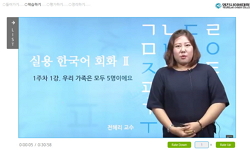This article analyzes grammatical forms of Mongolian and Korean which can describe past situations. Mongolian suffixes -laa, -jee and -v are past tense forms, but they have different evidential connotations: firsthand past -laa, non-firsthand past -je...
http://chineseinput.net/에서 pinyin(병음)방식으로 중국어를 변환할 수 있습니다.
변환된 중국어를 복사하여 사용하시면 됩니다.
- 中文 을 입력하시려면 zhongwen을 입력하시고 space를누르시면됩니다.
- 北京 을 입력하시려면 beijing을 입력하시고 space를 누르시면 됩니다.
부가정보
다국어 초록 (Multilingual Abstract)
This article analyzes grammatical forms of Mongolian and Korean which can describe past situations. Mongolian suffixes -laa, -jee and -v are past tense forms, but they have different evidential connotations: firsthand past -laa, non-firsthand past -jee and neutral past -v. Korean has two grammatical forms which are mainly employed for past situation description: -ess- and -te-. Korean -ess- is a past tense form but -te- is an evidential form. Korean -te- is a firsthand evidential (past sensory observation), indicating that the speaker has firsthand information about the situation and that the information was acquired before the speech time. Non-firsthand past -jee in Mongolian and firsthand evidential -te- in Korean show a superficial similarity in their subject restriction. They are not usually allowed in first person contexts. When the first person participants lack awareness, control or intention of the situation, -jee and -te- are allowed with first person participants, the so-called ‘first person effect’. This article proposes to divide firsthand evidentials into three subtypes depending on the referential scope of the observee: experiencer-oriented, performer-oriented and observer-oriented evidential. ‘First person effect’ is redefined in this article to incorporate examples from ‘observer-oriented evidential’.
참고문헌 (Reference)
1 송재목, "증거성(evidentiality)과 주어제약의 유형론-한국어, 몽골어, 티벳어를 예로 들어-" 형태론 9 (9): 1-23, 2007
3 Sohn, Ho-Min, "The Korean Language" Cambridge University Press 1999
4 Oswalt, Robert L., "The Evidential System of Kashaya" 29-45, 1986
5 Ko, Youngkun, "Tense, mood and aspect in Korean" Thaehaksa 2004
6 Song, Jae-mog, "Tense, Aspect and Modality in Khalkha Mongolian" University of London 1997
7 Moon, Sookyeong, "Tense Categories of Korean" Thaehaksa 2009
8 Aikhenvald, A. Y., "Studies in Evidentiality" John Benjamins 2003
9 Song, Jae-mog, "Semantic functions of the suffix -te-: from a typological perspective" 32 : 135-169, 1998
10 Lowe, Ivan, "On the relation of formal to semantic matrices with illustrations from Nambiquara" 8 : 360-390, 1972
1 송재목, "증거성(evidentiality)과 주어제약의 유형론-한국어, 몽골어, 티벳어를 예로 들어-" 형태론 9 (9): 1-23, 2007
3 Sohn, Ho-Min, "The Korean Language" Cambridge University Press 1999
4 Oswalt, Robert L., "The Evidential System of Kashaya" 29-45, 1986
5 Ko, Youngkun, "Tense, mood and aspect in Korean" Thaehaksa 2004
6 Song, Jae-mog, "Tense, Aspect and Modality in Khalkha Mongolian" University of London 1997
7 Moon, Sookyeong, "Tense Categories of Korean" Thaehaksa 2009
8 Aikhenvald, A. Y., "Studies in Evidentiality" John Benjamins 2003
9 Song, Jae-mog, "Semantic functions of the suffix -te-: from a typological perspective" 32 : 135-169, 1998
10 Lowe, Ivan, "On the relation of formal to semantic matrices with illustrations from Nambiquara" 8 : 360-390, 1972
11 Binnick, Robert I., "On the Pragmatic Differentiation of the Mongolian Past Tenses" Mongolian Studies 13 : 47-56, 1990
12 Ozawa, Shigeo, "Mongolian in four weeks" Daigakushorin 1963
13 Luvsanvandan, Sh, "Modern Mongolian Structure" Academy of Sciences 1968
14 Önörbayan, Ts, "Modern Mongolian Morphology" Pedagogical State University of Mongolia 1994
15 Kim, Jinung., "Korean Evidentials in Discourse" The University of Texas 2012
16 Seo, Thaeryong, "Forms and meanings of Korean inflectional suffixes" Thaehaksa 1988
17 Barnes, J, "Evidentials in the Tuyuka verb" 50 : 255-271, 1984
18 McLendon, Sally, "Evidentials in Eastern Pomo with a comparative survey of the category in other Pomoan languages" 101-129, 2003
19 Lim, Dongsik, "Evidentials and Interrogatives: A Case Study from Korean" University of Southern California 2010
20 Chafe, W, "Evidentiality: The Linguistic Coding of Epistemology" Ablex Publishing Corporation 1986
21 Aikhenvald, A. Y., "Evidentiality in typological perspective" 1-31, 2003
22 Maslova, Elena, "Evidentiality in Yukaghir" 219-235, 2003
23 Aikhenvald, A. Y., "Evidentiality in Tariana" 131-164, 2003
24 Song, Jae-mog, "Evidentiality in Korean" Seoul National University 2011
25 Dixon, R. M. W., "Evidentiality in Jarawara" 165-187, 2003
26 Lee, Jungmee, "Evidentiality and its interaction with tense: Evidence from Korean" The Ohio State University 2011
27 Garrett, Edward John, "Evidentiality and Assertion in Tibetan" University of California 2001
28 Aikhenvald, A. Y., "Evidentiality" Oxford University Press 2004
29 Nam, Ki-Shim, "A study of Korean tenses" Tower Press 1978
30 Song, Jae-mog, "A Typological Analysis of the Korean Evidential Marker -te" The Linguistic Society of Korea 32 : 147-164, 2002
31 Willett, Thomas, "A Cross-Linguistic Survey of the Grammaticalization of Evidentiality" 12 (12): 51-97, 1988
32 Mishig, L., "(Modern practical written Mongolian grammar" National University of Mongolia 1978
동일학술지(권/호) 다른 논문
-
- 계명대학교 한국학연구원
- 이정환
- 2013
- KCI등재,AHCI,SCOPUS
-
Pronunciation Typology of Consonant Sequences and Korean Language Education
- 계명대학교 한국학연구원
- 김선정
- 2013
- KCI등재,AHCI,SCOPUS
-
An Analysis and Interpretation of Korean Vowel Systems
- 계명대학교 한국학연구원
- 허용
- 2013
- KCI등재,AHCI,SCOPUS
-
A Study of the Korean Clausal Connectives ‘-ŏsŏ’ and ‘-ko’ of Temporal Sequence
- 계명대학교 한국학연구원
- 박동호
- 2013
- KCI등재,AHCI,SCOPUS
분석정보
인용정보 인용지수 설명보기
학술지 이력
| 연월일 | 이력구분 | 이력상세 | 등재구분 |
|---|---|---|---|
| 2023 | 평가예정 | 해외DB학술지평가 신청대상 (해외등재 학술지 평가) | |
| 2020-01-01 | 평가 | 등재학술지 유지 (해외등재 학술지 평가) |  |
| 2012-02-27 | 학회명변경 | 영문명 : institute of korean studes -> Academia Koreana |  |
| 2010-01-01 | 평가 | 등재학술지 선정 (등재후보2차) |  |
| 2009-01-01 | 평가 | 등재후보 1차 PASS (등재후보1차) |  |
| 2007-01-01 | 평가 | 등재후보학술지 선정 (신규평가) |  |
학술지 인용정보
| 기준연도 | WOS-KCI 통합IF(2년) | KCIF(2년) | KCIF(3년) |
|---|---|---|---|
| 2016 | 0.3 | 0.27 | 0.27 |
| KCIF(4년) | KCIF(5년) | 중심성지수(3년) | 즉시성지수 |
| 0.35 | 0.31 | 0.676 | 0.05 |






 KCI
KCI






